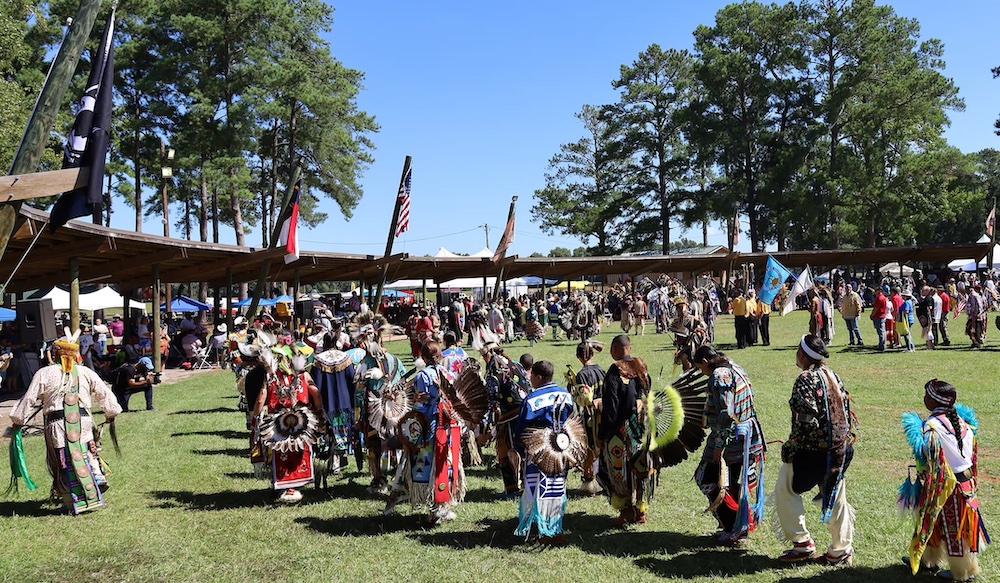
- Details
- By Levi Rickert
The Senate Committee on Indian Affairs is scheduled to hear testimony Wednesday afternoon on legislation that would grant federal recognition to the Lumbee Tribe of North Carolina.
At the center of the debate is S.107, the Lumbee Fairness Act, introduced Jan. 16, 2025, by Sen. Thom Tillis (R-N.C.). The bill seeks to extend full federal recognition to the Lumbee Tribe, which has sought such status for decades.
If enacted, the measure would make Lumbee citizens eligible for the same federal programs, services and benefits available to members of other federally recognized tribes.
The hearing is expected to feature testimony from both supporters and opponents of the proposal, reflecting long-standing divisions over the tribe’s recognition status.
The Lumbee Tribe of North Carolina, which received state recognition in 1885, has sought full federal recognition for nearly 140 years. With more than 55,000 citizens, the Lumbee are the largest tribe east of the Mississippi River and the ninth-largest in the United States.
Since 1988, Congress has introduced legislation to recognize the Lumbee Tribe more than 30 times, including several bills sponsored by Rep. Richard Hudson (R-N.C.). Bipartisan measures have cleared the House six times — most recently in December 2024 — but none have become law.
The tribe’s complicated legislative history dates back to the 1956 Lumbee Act, which recognized the Lumbee as an Indian tribe but denied access to the federal services and benefits available to other federally recognized tribes.
Not all tribes support Lumbee recognition. The Eastern Band of Cherokee Indians, a federally recognized tribe, has long opposed the effort. In 2020, when a similar measure passed the House, representatives of the Cherokee and Choctaw Nations wrote to Congress expressing “doubt and uncertainty” about the Lumbees’ lineage and genealogy.
Tensions resurfaced in October 2024 when unauthorized cards opposing the Lumbee’s recognition were distributed at the National Congress of American Indians’ annual convention in Las Vegas. The materials, which falsely bore the United Indian Nations of Oklahoma’s logo, led NCAI to issue an apology to the Lumbee Tribe and condemn the “inflammatory materials” as a violation of its code of conduct.
During the 2024 presidential campaign, Donald Trump publicly promised that, if elected, he would support legislation to grant full federal recognition to the Lumbee Tribe of North Carolina. Specifically, on Sept. 23, 2024, at a rally in Wilmington, N.C., he said:
“Today, I’m officially announcing that, if I am elected in November, I will sign legislation granting the great Lumbee Tribe federal recognition that it deserves.”
Three days after beginning his second term, on Jan. 23, 2025, President Donald Trump signed a memorandum directing the secretary of the interior to explore paths toward federal recognition for the Lumbee Tribe.
The memorandum, which does not grant federal status to the 55,000-member tribe, directed the Interior Department to submit a plan within 90 days outlining options for the Lumbee to gain full federal recognition and benefits. Trump was the first president to sign such a directive.
“Considering the Lumbee Tribe’s historical and modern significance, it is the policy of the United States to support the full federal recognition, including the authority to receive full federal benefits, of the Lumbee Tribe of North Carolina,” the memorandum states.
The 90 days came and went without a report being released to the public.
The Senate Committee on Indian Affairs is set to hear testimony on the issue Wednesday, Nov. 5, 2026, at 2:30 p.m.
The hearing will be webcast live on the Committee’s website, and an archived video will be available shortly after the hearing concludes. Witness testimony will be available on the website at the start of the hearing.
WITNESSES:
PANEL 1
- THE HONORABLE THOM TILLIS
PANEL 2
- THE HONORABLE JOHN LOWERY, Chairman, Lumbee Tribe, Pembroke, NC
- MS. ARLINDA LOCKLEAR, Tribal Attorney, Washington, DC
- THE HONORABLE MICHELL HICKS, Principal Chief, Eastern Band of Cherokee Indians, Cherokee, NC
- THE HONORABLE BEN BARNES, Chief, Shawnee Tribe, Miami, OK
WHERE:
Dirksen Senate Office Building, Room: 106
(Note: Location has changed to accomodate an expected large crowd).
Watch the hearing live here.
More Stories Like This
Navajo Council Committees Tackle Grazing Enforcement, Code RevisionsU.S. Must Fulfill Obligations by Protecting Programs
50 Years of Self-Determination: How a Landmark Act Empowered Tribal Sovereignty and Transformed Federal-Tribal Relations
Trump Veto Stalls Effort to Expand Miccosukee Tribal Lands
Oneida Nation Responds to Discovery Its Subsidiary Was Awarded $6 Million ICE Contracts
Help us defend tribal sovereignty.
At Native News Online, our mission is rooted in telling the stories that strengthen sovereignty and uplift Indigenous voices — not just at year’s end, but every single day.
Because of your generosity last year, we were able to keep our reporters on the ground in tribal communities, at national gatherings and in the halls of Congress — covering the issues that matter most to Indian Country: sovereignty, culture, education, health and economic opportunity.
That support sustained us through a tough year in 2025. Now, as we look to the year ahead, we need your help right now to ensure warrior journalism remains strong — reporting that defends tribal sovereignty, amplifies Native truth, and holds power accountable.
 The stakes couldn't be higher. Your support keeps Native voices heard, Native stories told and Native sovereignty defended.
The stakes couldn't be higher. Your support keeps Native voices heard, Native stories told and Native sovereignty defended.
Stand with Warrior Journalism today.
Levi Rickert (Potawatomi), Editor & Publisher


